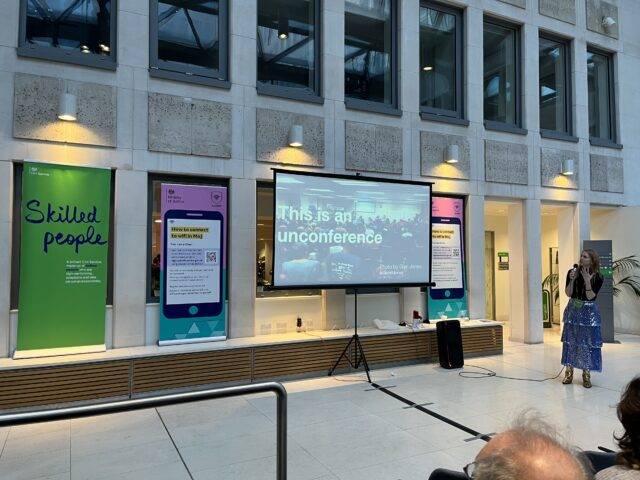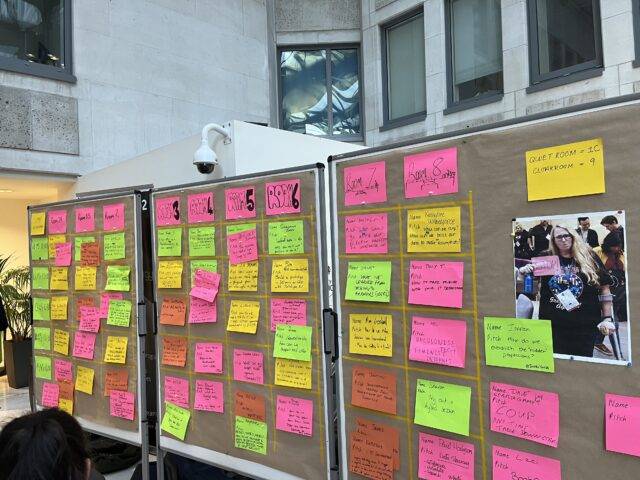
Highlights from UK Gov Camp 2023
On Saturday the 21st of January, I attended my first UK Gov Camp which was sponsored by Hitachi Solutions. It was a free, annual ‘unconference’, hosted at the Ministry of Justice Headquarters, for people interested in how the public sector does digital.
For this fun event, the attendees just needed to bring their opinions, questions and ideas they wished to discuss in order to set the agenda for the day. It was a unique event, hearing, sharing, and learning from the open lively discussions. Allowing me to gather insights from passionate individuals, on what matters most to them, within Government.
In this blog, I will share my key takeaways from 3 of the many sessions I attended. Generally, this year the themes challenged the current ways of working across Data, User-Centred Design, accessibility, hybrid working and leadership.


The first session named “PANIC! at the disco” explored how we stop wasting money on dead-end discoveries. I heard first-hand some of the struggles and experiences of what makes a good discovery.
A discovery is the first phase of an agile delivery for a digital project in government which analyses the problem to be solved.
Before any commitment is made to building a service, the problem needs to be analysed and understood. This is done by conducting user research as well as understanding any constraints that might be encountered before a solution is found for the problem. If you take the project to the next stage – “alpha” – it means that the benefits of looking further into the problem, outweigh the cost.
It was quickly realised that there has been a change in perception where bad practices have developed. These include conducting a Discovery to prove an opinion of a stakeholder or an already proposed solution.
Some of the good practices that partners could leverage include an emphasis on:
- Blended teams to avoid the divorce of the contractor and civil servant which is likely to lead to better outcomes and ceremonies as one team.
- Involve the problem owner who forms part of this team from the beginning.
- Reset expectations on what discovery is, and what are the outcomes to reinforce the need for the discovery as well as any misconceptions as many teams have different experiences and levels of understanding.
- Setting very clear outcomes and goals on what needs to be achieved with success criteria which also includes an element of flexibility.
In the discussion, there were mixed opinions on whether prototyping has a place in discovery or if it is a deliverable of Alpha. Sometimes prototyping in discovery to bring something to life can help get stakeholder buy-in.
The second session raised pertinent questions about the attitude of data and ownership. One civil servant expressed that when speaking to senior stakeholders about data ownership and responsibility of the data, the topic can alienate some people in the room as this becomes a technical and non-technical conversation. In most cases, HR and Finance are seen as an asset, however, not all government departments share the same view regarding data. As organisations progress to see the paradigm shift towards viewing data as an asset, the question lies where the gap can be resolved. The session led to the outcome that; the solution lies within data literacy. We identified that this can be solved through the creation of specialised roles within this discipline or to encourage the importance of data literacy listed as a competency throughout job specifications.
The last session looked at the future of User Centred Design (UCD). Essentially, User-Centred Design is creating services for humans so that they can interact with Public Sector services in the simplest and easiest way. This includes service designers, user researchers, and UCD designers and looks at elements such as accessibility.
With the increased functionality of many external services (retail, banking, technology), citizen users are now expecting an increased level of service. One example of this is applying for a form of identification such as a passport or a driver’s licence; the process can now be completed online.
UCD needs to keep up with external trends and functionalities users are interacting with. UCD teams can be separate teams and drawn upon as a resource, working only on certain parts of the process. There is also a tendency to think user-centred design is only for digital spaces, but in practice is more commonly seen used in the front end. However, UCD teams should be present throughout the whole journey to maintain consistency. It should be for the 21st century working, without getting locked in digital and be applied more in a non-digital space.
Finally, I would describe the day as insightful, fun and thought-provoking.
For anyone looking to expand their knowledge of the Public Sector or network, I would highly recommend they attend a UK Gov Camp event.
